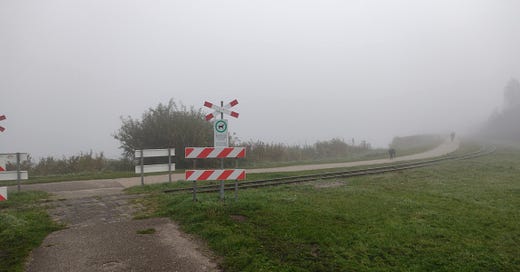When I started reading this book, I found myself reading the same page at least four times. This isn’t that unfamiliar a feeling, but something was different about the prose. Events, the stuff that makes narratives happen, were buried in lengthy tracts of description. Somehow there was no clear distinction between the vital exposition that one has to take in to understand the book, and the imagery that enriched it.
I am not a very storied reader (geddit) but Housekeeping reads like little else. The sheer commitment to visual description at the expense of narrative surely have few rivals. Robinson’s description is equally peerless in quality. There are penetrating insights, enviable originality and above all sentences that I didn’t think were possible.
Housekeeping is a dark novel, but there is warmth in the darkness. Tragedies do happen, but they are at a distance. The most important few events (and there are very few) in the text are given the fewest words. What we have instead is a relentless and microscopic description of the interior life of a house and its inhabitants. Robinson’s ability to capture the experience of a younger sibling is commendable; the confusion and faintly comic absurdity of it.
As talented as Robinson is, the commitment to the well-wrought image might be a real problem for Housekeeping. See, the novel was one of the most soporific I have ever read. The really strange thing is that I savoured every moment of slipping consciousness, as one slides into her damp, decayed, peculiar mental landscape. This is a text that will send you to sleep while being utterly compelling. I did not think this was possible.
What I also didn’t think possible was coming away from a piece of art after thinking about it for some time and still having no firm sense of whether it was great, good, mediocre, or bad. I don’t think Housekeeping was a bad book. Indeed, the rest of the world seems convinced it is indeed very good. “One of the Observers 100 Greatest Novels of All Time” declares my copy’s cover. But I could be equally convinced, with a firm enough argument, that this book is indeed bad in spite of its many many many beautiful moments.
I tend towards the opinion that rules in artwork are a good idea; that creativity only makes sense within some armature of tradition, repetition, boredom even. Even the abstract expressionist painters were deeply traditional in their approach, and scrupulously repetitive. Were this not true, it would be impossible to name a Frankenthaler out of a room of Pollocks. It is so very easy.
Housekeeping doesn’t break the rules of the novel in any blinding way, or through some clever conceit. What it does, rather, is dial up a feature of almost all writing (imagery) to an extent that few other would dare. In this way, Housekeeping is the polar opposite to Biblical prose: a collection of curiously aphantasic but question-begging reportage: “And God saw that it was good.” In much of Christian scripture you cannot move for laconic statements, with the odd evocative noun like fig leaves or cedar to cling to. In Housekeeping, it’s all nouns. This is ironic, given Robinson is clearly fascinated by the peculiarities of the Bible and particularly the bluntness of the Old Testament, which she dwells upon towards the close of the novel.
To a degree, Housekeeping is a poem disguised as a novel. It is entirely consistent in what it does. Attacking it feels like criticising the mores or a sovereign nation from afar. Robinson absolutely knows what she is doing. But can Housekeeping remain a great novel when it refuses to give us the highs and lows that we go to novels to feel? I don’t know.
Have you read Housekeeping? Do you agree with me? Do you think description in prose is a delight or a distraction, and are there limits?






I like your piece of writing but I absolutely disagree .
I think the subtlety of how she straddles prose ,poetry and story telling in this quiet and strange tale is extraordinary .
A very quiet life with an undercurrent of darkness for sure .but it's sheer genius in my opinion
.I bid you to read Gilead and jack ..then think again .
Thou shalt not speak badly of this wonderful woman !!!
You should try Robinson's non-fiction. As you say, her obsession with Old Testament peculiarities does not seem to trickle into the prose in her novels, but when she's writing non-fiction she has to write more tightly in order to actually make an essay-length point about the phenomenon under consideration - often the Old Testament is itself is the phenomenon, and close non-fiction focus on the OT seems to sharpen her prose. I've heard interesting things about her recent commentary on Genesis (though she has a very annoying tic, of presenting her dogmatic, knee-jerk objections to modern Biblical scholarship as if they were a galaxy-brained transcending of its limits), and her stuff about the line from the Old Testament through Calvin's social thought to modern American liberalism (e.g. 'Open Thy Hands Wide') is really interesting.